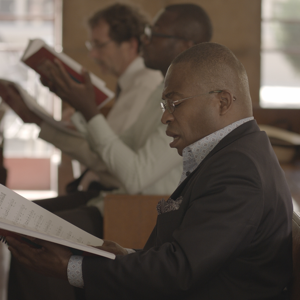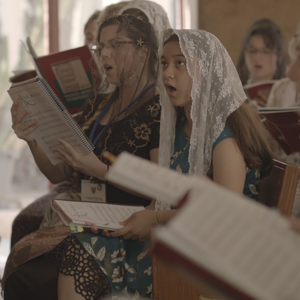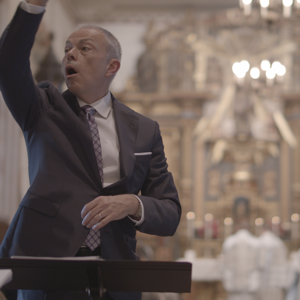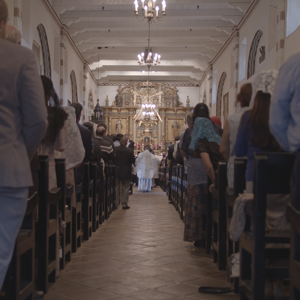
 LEFT FOR LOGAN Airport at 4:45 a.m. Layover in Phoenix. Then on to Burbank “Bob Hope” Airport. I had four hours of sleep having conducted the “The Star Spangled Banner” at Fenway Park the night before with eighty singers of the Boston Archdiocesan Choir including twenty-six children. I had a 1:30 p.m. rehearsal in Los Angeles to get to. I was running on caffeine and adrenalin, but also fortified by the love and joy of the children and adults who sang the night before in Boston.
LEFT FOR LOGAN Airport at 4:45 a.m. Layover in Phoenix. Then on to Burbank “Bob Hope” Airport. I had four hours of sleep having conducted the “The Star Spangled Banner” at Fenway Park the night before with eighty singers of the Boston Archdiocesan Choir including twenty-six children. I had a 1:30 p.m. rehearsal in Los Angeles to get to. I was running on caffeine and adrenalin, but also fortified by the love and joy of the children and adults who sang the night before in Boston.
On the flight I wore a suit jacket and dress shoes so I wouldn’t have to pack them. Getting off the plane I looked around. I appeared and felt very out of place in L. A.
Until I got to choir rehearsal.
Greeting me at the Sacred Music Symposium were seventy-five singers (many in high school!) ready to sing chant and polyphony all day long. These were my people! After a another rehearsal later in the day of Palestrina, Morales, and a brand new work by Kevin Allen, I wasn’t tired. Quite the opposite, I was energized. Why?
* * Mp3 • Live Recording at Mass • Sanctus & Benedictus • Missa Jam Christus, Palestrina
Likewise, upon my return to the Cathedral of the Holy Cross Sunday morning, I had another sleep deprived night getting in after midnight followed by an early morning Mass. During a choir rehearsal and Mass I was once again invigorated, not depleted.
It seems I am very fortunate to work with great, positive people. This includes professionals who are sensitive and attentive to the needs of volunteers. I have been the beneficiary of beautiful, dedicated, and talented people, both professional and volunteer from all over the Archdiocese of Boston. This is spiritual and musical gold for which I must get on my knees and thank God every day. I am truly lucky for such people in my life, and I deeply grateful.


 HE SALUTARY EFFECTS of choral singing have been often noted. Much has been made of the educational benefits of musical training. Likewise, the release of endorphins while singing in a choir may combat depression, anxiety, or loneliness.
HE SALUTARY EFFECTS of choral singing have been often noted. Much has been made of the educational benefits of musical training. Likewise, the release of endorphins while singing in a choir may combat depression, anxiety, or loneliness.
But to achieve this, leaders and directors must be positive. They must love the rehearsal process. They must be excited most of all by improvements made along the way — not just by a polished final product. Conductors must never make sacred music about themselves. How ridiculous and vain!
Most importantly, the environment must be encouraging (especially with children) and relaxed, yet highly focused. Singers cannot be expected to produce beauty in a tense environment. The vocal mechanism must be relaxed by necessity. Making music with fear of reprisal is counterproductive and deleterious to the soul. While there may be tough love for some situations, there must be love — love of God, love of the music, love of God’s people. And there must be gratitude.

 HE 2019 SACRED MUSIC Symposium was a model of positivity and healing effects of not only choral singing, but faith-filled choral singing. Making music is an intimate relationship. But to pray and make music together elevates the spirit even further.
HE 2019 SACRED MUSIC Symposium was a model of positivity and healing effects of not only choral singing, but faith-filled choral singing. Making music is an intimate relationship. But to pray and make music together elevates the spirit even further.
As such, I am deeply grateful to faith-filled choral singers because of their willingness to do and understand these ten things. (This also applies to conductors!):
1 • Willingness to serve others. Singing in a choir is not about oneself. Nor is directing a choir! Developing a unified choral sound – where many sing as one voice – requires (and produces) an elevated state of consciousness. There is no room for narcissism, only altruism: prayer and service to others — not service of self.
2 • Willingness to subject to another’s will, vision, or preference.
3 • Willingness to have a spiritual intent of unity, respect, and reverence.
4 • Willingness to practice Christian charity towards your brothers and sisters all the time. Fr. James Fryer, in his Keynote Address at the Symposium, spoke of the necessity of “fraternal charity.” To this end, he emphasized the importance of a choir working towards holiness and attending to their own prayer lives —ironically a challenge for Church musicians! But take heart and remember that all your musical preparation is a prayer!
5 • Willingness to row in the same direction for the greater good — giving glory of God and the edification and sanctification of the people.
6 • Willingness to be flexible and understand there is often more than one correct answer to musical questions.
7 • Willingness to deliver and not let each other down: Because excellent choral singing requires enormous concentration, sustained physical exertion, and consistent commitment to succeed.
8 • Willingness to dedicate large and inconvenient amounts of time — holidays, evenings, weekends, i.e., time away from family and friends
9 • Willingness to grow spiritually, personally, and musically
10 • Willingness to understand life is too short to get bent out of shape over a good many things — yet, willingness to be uncompromising in passing on the traditions of the church. Why? Because our traditions inform us of who we are today! They hold in them a treasure of our ancient wisdom.
11 • Countless more things to be grateful for… (Yes, this list of 10 things goes to 11.)


 OSITIVITY IS a strong healer. At the symposium faculty not only got along well, we sang under each other’s direction. This level of mutual respect and cooperation elevated everyone’s performance and spirit. For example, I personally learned a great deal from Dr. Alfred Calabrese while singing under his direction. His technique and clarity is impeccable. His interpretation of chant was transcendent and his rehearsals exceedingly efficient improving the sound of the choir overnight. I left a better conductor than when I arrived because of him.
OSITIVITY IS a strong healer. At the symposium faculty not only got along well, we sang under each other’s direction. This level of mutual respect and cooperation elevated everyone’s performance and spirit. For example, I personally learned a great deal from Dr. Alfred Calabrese while singing under his direction. His technique and clarity is impeccable. His interpretation of chant was transcendent and his rehearsals exceedingly efficient improving the sound of the choir overnight. I left a better conductor than when I arrived because of him.
Likewise, Kevin Allen’s compositions had me in tears. Furthermore, I was amazed at his complete trust in my interpretation of the world premiere of his “Ave Maria.” The determination, towering intellect, talent, and humility of Jeff Ostrowski is a transformative force to behold. He is a true servant leader. Finally, Andrea Leal’s organization (that began in 2018) and generous hospitality was an unseen and vital key to the Symposium’s success.
The level of positivity in such a faith-filled environment leads to an acceleration of energy—spiritual and physical. Despite several hours of rehearsal a day plus Mass and Vespers, the collective group seemed to gather more energy and will as time went on. Jeff Ostrowski tried to give us a break in a recording session, and the singers demanded to keep working more! We didn’t want to let go. This is healing.


 F COURSE, there are daily struggles in life. We are called to carry one cross or another for our entire lives. We wish they would go away, but such challenges are the crucible by which we learn to better serve God and one another. When crosses burden us, know that God will also never leave you comfortless. Sing his praises with love!
F COURSE, there are daily struggles in life. We are called to carry one cross or another for our entire lives. We wish they would go away, but such challenges are the crucible by which we learn to better serve God and one another. When crosses burden us, know that God will also never leave you comfortless. Sing his praises with love!
Let everything that has breath give praise to the LORD! — Psalm 150
